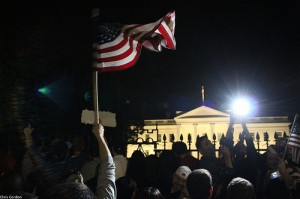Osama bin Laden is Dead: D.C’s South Asian Muslims React
Afshan Khoja, a Muslim of Pakistani descent who lives in the DC area, was in tears after President Obama announced the death of Osama bin Laden.
“It wasn’t because I was happy about bin Laden’s death, it was because suddenly all the things that September 11th have done to me, my religion and my country, came back to me: The fear of being asked questions while traveling; the immediate requirement to defend my religion not only when people asked why Muslims hate America, but also when terrorists did anything that could remotely be associated with Muslims; the feeling that somehow, I’ll always be ‘the other’ in America.”
Mou Khan, a Bangladeshi-American, also found herself reflecting on September 11th, after learning of bin Laden’s death.
“I remember exactly where I was when I first heard that a plane had struck one of the towers of the World Trade Center. My memories are deeply personal, like when a schoolmate I didn’t know called me a terrorist…now, confronted with the news that Osama bin Laden, the man behind the tragedy, has been killed, I find myself conflicted.
“I cannot find it within myself to celebrate violence and extrajudicial killing, no matter how strong an urge for vengeance the trauma of September 11th left me,” said Khan, in reference to the celebration that took place in front of the White House as news broke of bin Laden’s death.
“I find myself deeply uncomfortable with the unbridled nationalistic celebrations that broke out across the country. Was it all worth it now that we know bin Laden’s blood has been shed? Is speaking up and asking questions during this fervor unpatriotic?”
Khan was not the only one with questions. News outlets like NPR asked, “Is It Wrong To Celebrate Bin Laden’s Death?”
Khoja wondered about the aftermath of such public displays of patriotism.
“When I heard the chants of “U-S-A, U-S-A” I felt fear. I don’t understand why, but I wanted to lock my doors. This morning I heard about vandalism and graffiti at a mosque. Between yesterday and today, three people have already asked me why the Pakistani government didn’t know that Osama was in Pakistan for years – I don’t know!
“The fact is, regardless of this news, none of that has stopped. This may be a significant blow to a terrorist network, but for a Pakistani Muslim living in the US, I’m not sure if it changes anything.”
Emma Khan (no relation to Mou Khan) whose family is originally from Bangladesh, said she thought all the singing and shouting was understandable. “Sometimes, people want to get together for huge events like this; it’s a victory for the US.”
Ibrahim Hooper, the National Communications Director for the Council on American-Islamic Relations (CAIR) wasn’t surprised at the public celebrations.
“That is almost inevitable in situations like this. I think it’s a temporary phenomenon based on the ten years it took to track down Osama bin Laden. I hope it doesn’t spill over in to hyper-patriotism.”
Shahid Buttar, a local performance artist and civil rights lawyer worried that other issues were being obscured by the focus on bin-Laden’s death.
“While it’s an exciting national security development, it does very little to address the ongoing constitutional crisis that emerged after the 2001 attack. I hope it allows the restoration of sanity here in the U.S. I’m glad (President) Obama is achieving gains in the war on terror, but the idea that we’d meet the death of any individual with chants of ‘USA, USA!’ reflects a shallowness in our understanding of these events and their implications.”
When the President addressed the nation, he emphasized that the war on terror was not a war on Islam:
As we do, we must also reaffirm that the United States is not –- and never will be -– at war with Islam. I’ve made clear, just as President Bush did shortly after 9/11, that our war is not against Islam. Bin Laden was not a Muslim leader; he was a mass murderer of Muslims. Indeed, al-Qaeda has slaughtered scores of Muslims in many countries, including our own. So his demise should be welcomed by all who believe in peace and human dignity.
Ibrahim Hooper said, “I think he struck the appropriate tone and clearly said we’re not at war with Muslims. I think he hit it just right.”
But Khoja said it will take more than Presidential words to address how Muslims are treated in post 9/11-America.
“While the administration did make specific statements supporting Islam, I feel like there’s a lot more work to be done. Ten years of dealing with hate crimes, backlash, alienation and “otherization” will not just go away. But I do think that this is an opportunity for us to take a step back, learn from our mistakes, and perhaps revisit some our values – of tolerance, diversity, acceptance, justice and peace. I hope that we’ll find a space and forum to do that.”






